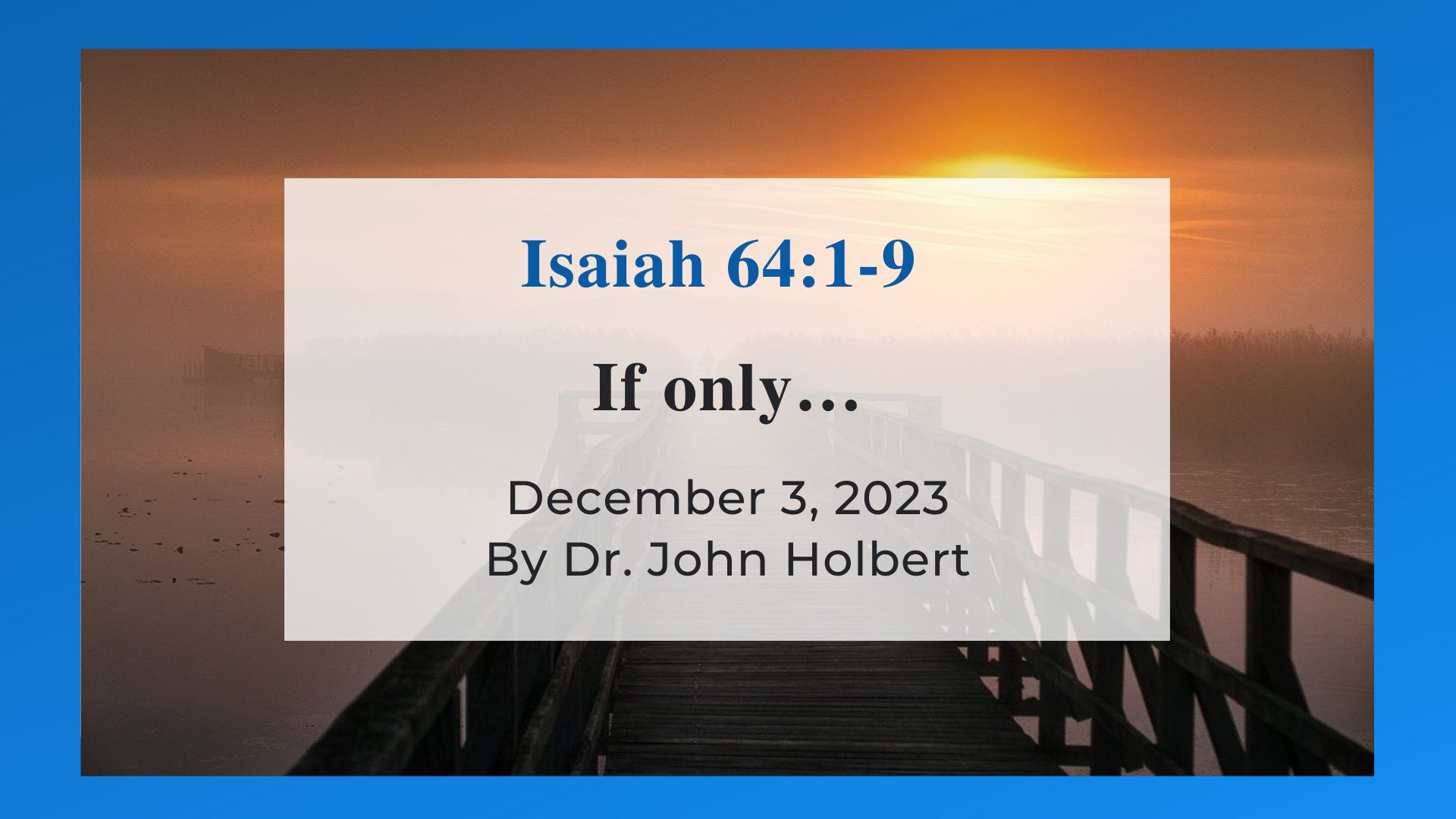If only… - Reflections on Isaiah 64:1-9
by Dr. John Holbert on Monday, November 27, 2023

If only…
Isaiah 64:1-9
The Peripatetic Hebrew Bible Preacher
In my long experience of church, I have noticed that the Advent/Christmas season is treated not unlike merchants who use the season to make the bulk of their money for the year. It has been determined that fully 40% of the profits made by any number of sellers are gained during the months of November and December. Without a smashing Christmas, the season will be sad indeed for any number of stores and companies. And so it is in church. Lest the candles glow brighter, the choirs sing more lustily, the pageant replete with tiny angels, sheep, and baby, somehow the church is seen as a failure, a mere shadow of the glory that should be Christmas. Have we church-goers and leaders made a serious mistake with this kind of thinking?
Would we not be better served, and would we not be more in tune with the full range of the gospel, if we took less time arranging the accouterments of Advent/Christmas, and paid far closer attention to the rich context of the original concerns that made the season possible in the first place? Now, I suppose you who have read my material on the Bible over the years would expect me to send us all back to the scriptures for a refresher course on why we do all that Christmasy stuff year after year. This Advent will be no different, as I urge us to look again at the amazing historical background of the texts that have shaped our celebrations. Today’s text, Is.64, appears to have a context little different than the one we face now in the late first quarter of the 21st century. Might that ancient context of some 2500 years ago help us to generate Advent/Christmas celebrations more worthy of God’s call for us to get clear about our task as 21st-century Christians?
I am struck by Is.64:1-2, and its hope: “If only (or “O that you would…”) tear open the skies and come down, so that the mountains would quake at your presence…to make known your name to your adversaries, so that nations might tremble at your presence!” Such language is generated by a people who find themselves helpless in the midst of multiple trials that they cannot seem to overcome. The historical context of Is.64, like that of all the oracles of the so-called “Third Isaiah” (Is.56-66), is difficult to pinpoint. The text surely was composed during that supposed Israelite “dark age,” the time between the destruction of Jerusalem in the early 6th century BCE, the return by some Babylonian exiles to the city in and after 539BCE, and the subsequent years when the fractured nation was trying to reconstitute itself in the promised land. While some exiles returned from Babylon to Israel, many stayed in Babylon and in Egypt and elsewhere, forming communities in exile from which arose some of the most important documents of an emerging world of Judaism. The author of Is.64 sounds like one who longed for the ancient stories of YHWH’s grand appearances to the chosen people in powerful fire to be made manifest again in his/her own time.
But we must ask: is that what they and we need? Do we really want a divine display of awesome force in order that we might win or conquer adversaries who threaten to overwhelm us? Surely, many conservative Christians do indeed seek and hope for just such a display. That is why they focus on the “rapture,” a future time when Jesus comes to redeem his own from the earth and sends all adversaries to a scorching Hell for eternity, as the redeemed watch in satisfaction while their enemies are roasted forever, as the blessed sing hymns for all time. That image is so repulsive, so disgusting, so unlike the gospel that I remain appalled that many still cling to it. Yet, is it not rather like the call of Is.64? Not quite.
Is.64 notes that those punished are not merely the enemies of Israel but Israel itself! Jerusalem and other Israelite cities have “become a wilderness;” that place “where our ancestors praised you has been burned by fire” (Is.64:11). “After all this, will you keep silent, and punish us so severely” (Is.64:12)? This is no simple hope for the destruction of Israel’s enemies, but rather a fear that the anger of God will not continue against Israel.
All that leads me to think quite differently about what we might learn differently about this text, and how we might differently shape our thinking about Advent/Christmas this year in the light of Is.64 and the subsequent Advent texts for 2023: Is.40, Is.61, and 2 Samuel 7. Rather than pray and hope for an intervention of our God to save us and “get” them, perhaps we may learn that our call for God may yield something quite different. What we may see is a God who “comforts,” a God who “carries lambs,” a God who rebukes those who would build temples while their hands smoke with blood. The God who comes at Christmas is far from the God envisioned in Is.64. The baby God is certainly the God we need, surrounded as we are with more turmoils and confusions than we can count. Let us keep our eyes on our expectations this Advent and work hard to avoid asking for the presence of a God who flashes power, rather than for a God who comes with love and compassion for all.
